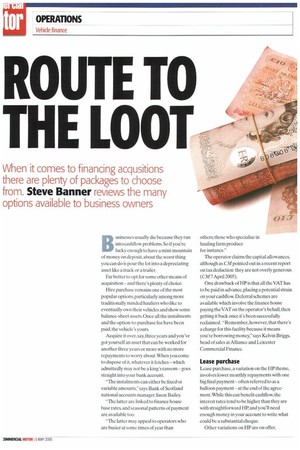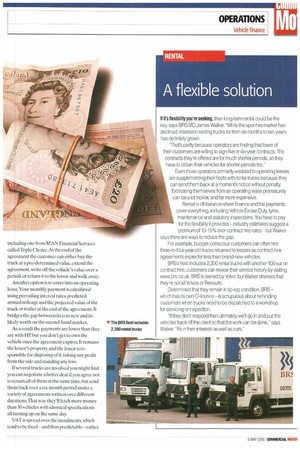ROUTE TO THE LOOT
Page 50

Page 51

If you've noticed an error in this article please click here to report it so we can fix it.
When it comes to financing acqusitions there are plenty of packages to choose
from. Steve Banner reviews the many
options available to business owners
Businesses usually die because they run into cashflow problems. So if you're lucky enough to have a mini-mountain of money on deposit, about the worst thing you can do is pour the lot into a depreciating asset like a truck or a trailer.
Far better to opt for some other means of acquisition —and there's plenty of choice.
Hire purchase remains one of the most popular options, particularly among more traditionally minded hauliers who like to eventually own their vehicles and show some balance-sheet assets. Once all the instalments and the option-to-purchase fee have been paid, the vehicle's yours.
Acquire it over, say, three years and you've got yourself an asset that can be worked for another three years or more with no more repayments to worry about. When you come to dispose of it, whatever it fetches—which admittedly may not he a king's ransom — goes straight into your bank account.
"The instalments can either be fixed or variable amounts," says Bank of Scotland national accounts manager Jason Bailey.
"The latter are linked to finance house base rates, and seasonal patterns of payment are available too.
"The latter may appeal to operators who are busier at some times of year than others; those who specialise in hauling farm produce for instance."
The operator claims the capital allowances, although as CM pointed out in a recent report on tax deduction they are not overly generous (CM 7 April 2005).
One drawback of HP is that all the VAT has to be paid in advance, placing a potential strain on your cashflow. Deferral schemes are available which involve the finance house paying the VAT on the operator's behalf, then getting it back once it's been successfully reclaimed. "Remember, however, that there's a charge for this facility because it means you're borrowing money," says Kelvin Briggs, head of sales atAlliance and Leicester Commercial Finance.
Lease purchase
Lease purchase, a variation on the RP theme, involves lower monthly repayments with one big final payment — often referred to as a balloon payment —at the end of the agreement.While this can benefit cashflow.the interest rates tend to be higher than they are with straightforward FIR and you'll need enough money in your account to write what could be a substantial cheque.
Other variations on TIP are on offer, including one from MAN Financial Services calledTriple Choice. At the end of the agreement the customer can either buy the truck at a pre-determined value, extend the agreement, write off the vehicle's value over a period, or return it to the lessor and walk away.
Another option is to enter into an operating lease. Your monthly payment is calculated using prevailing interest rates, predicted annual mileage and the projected value of the truck or trailer at the end of the agreement. It bridges the gap between its cost new and its likely worth on the second-hand market.
As a result the payments are lower than they are with HE but you don't get to own the vehicle once the agreement expires. It remains the lessor's property and the lessor is responsible for disposing of it, taking any profit from the sale and standing any loss.
If several trucks are involved you might find you can negotiate a better deal if you agree not to return all of them at the same time, but send them back over a six-month period under a variety of agreements written over different durations. That way they'll fetch more money than 30 vehicles with identical specifications all turning up on the same day.
VAT is spread over the instalments, which tend lobe fixed — and thus predictable —rather V it's flexibility you're seeking, then long-term rental could be the key, says BRS MD James Walker. "While the spot-hire market has declined, interest in renting trucks for from six months to two years has definitely grown.
"That's partly because operators are finding that fewer of their customers are willing to sign five or six-year contracts. The contracts they're offered are for much shorter periods, so they have to obtain their vehicles for shorter periods too," Even those operators primarily wedded to operating leases are supplementing their fleets with rental trucks because they can send them back at a moment's notice without penalty. Extricating themselves from an operating lease prematurely can be a lot trickier, and far more expensive.
Rental is off-balance-sheet f inance and the payments cover everything, including Vehicle Excise Duty, tyres, maintenance and statutory inspections. You have to pay for the flexibility it provides industry estimates suggest a premium of 10-15% over contract hire rates but Walker says there are ways to reduce the gap.
For example, budget-conscious customers can often hire three-to-four-year-old trucks returned to lessors as contract-hire agreements expire for less than brand-new vehicles.
BRS's fleet includes 2,200 rental trucks with another 400 out on contract hire; customers can review their service history by visiting www.Ors.co.uk, BRS is owned by Volvo, but Walker stresses that they're not all Volvos or Renaults.
Determined that they remain in tip-top condition, BRS which has its own 0-licence is scrupulous about reminding customers when trucks need to be dispatched to a workshop for servicing or inspection.
If they don't respond then ultimately we'll go in and pull the vehicles back off the client so that the work can be done," says Walker. it's in their interests as well as ours."






































































































































































































